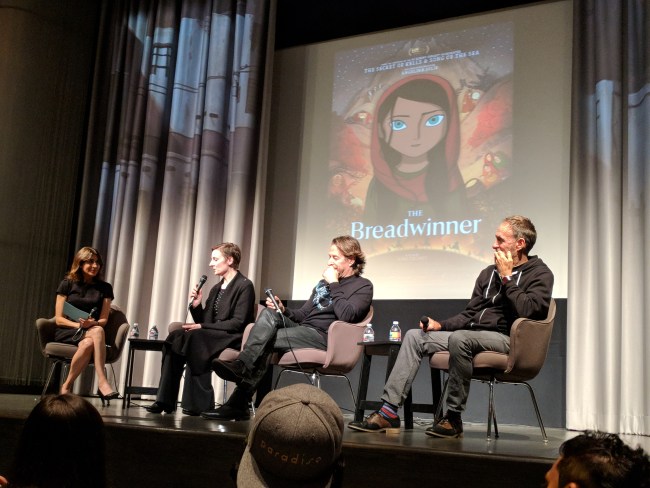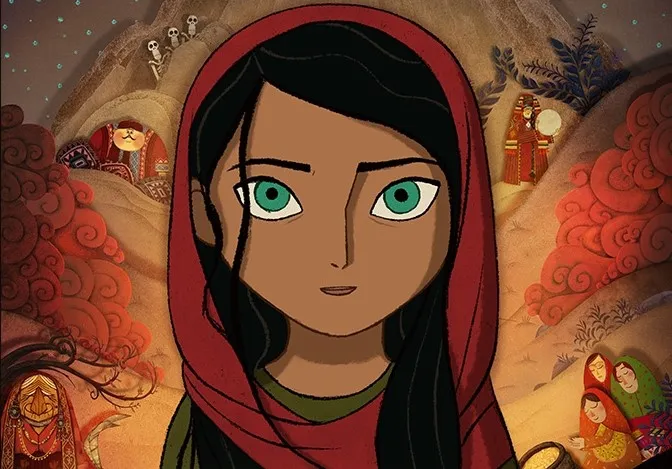Irish director Nora Twomey, has already made a huge impression on animation as the director of the Academy Award-nominated film, The Secret of Kells. Now, she’s delivering her second feature film, The Breadwinner, based on the best-selling children’s novel by Deborah Ellis.
I had the pleasure of attending an advance screening of the film at L.A’s Museum of Tolerance, and you’ll be able to check out my full review here at TMS next week. What I will say now is that the film is beautiful, both visually and with regard to its storytelling.
It tells the story of an 11-year-old girl in Kabul, Afghanistan named Parvana, who has a very close relationship with her father Nurullah, a teacher and storyteller who received a Western education before the rise of the Taliban and made sure Parvana was educated. When he is unjustly arrested, Parvana and her mother Fattema go to the prison to attempt to petition for his release, and Fattema is beaten. Once Parvana gets her back home, Fattema falls into a deep depression, leaving Parvana, her older sister Soraya, and her baby brother to fend for the family.
Under the Taliban, women are forbidden from traveling without men, and so with no one to earn money or escort them out of the house, the food quickly gets used up and the family is at risk of starvation. Parvana decides to cut her hair and dress up as a boy to go out and provide for her family, doing so by selling goods at market and providing reading and writing services the way her father did.

(l-r) Moderator Carolyn Giardina (The Hollywood Reporter), Director, Nora Twomey, Composers Mychael and Jeff Danna at a screening of “The Breadwinner” at The Museum of Tolerance in Los Angeles.
There are many themes that run through the film, and one of the things of which Twomey is the proudest is that, “it seems to be different things with different people.” She continues:
“For me, it’s very much a story of hope. For me that’s the main theme that runs through the whole film, and the strength in a young girl like Parvana is something that I think a lot of people connect with. We had the privilege of showing the film to the First Lady of Afghanistan Rula Ghani, who I think looked at it as something that was celebrating the strength of Afghan women and the idea of education. She pointed out that Parvana uses her ability to read and write to provide for her family. For her, that was kind of important.”
I asked Twomey what she hoped the film would accomplish once it came out, as there is a planned educational component along with the film that will be provided to schools. She said:
“When we had our cast and crew screening, one of our cast sat with her dad who had come from Afghanistan during the communist era and had witnessed a lot of atrocities and hadn’t spoken to her about them, and I could see that they were holding hands all through the screening. Afterwards, he spoke to her in Dari at length about things he’d witnessed.
I think people telling stories is very important. Parvana tells a story in this film. If it begins conversations, or sheds any light on the stories people have to tell in Afghanistan and around the world, and if children here began to ask their parents or their teachers about children like Parvana, I think for me that would be extremely special.”
If you’d like to support Afghan girls like Parvana, consider supporting Feminist Majority Foundation’s campaign to ensure that Afghan girls receive the technology they need to pursue their education in the 21st Century. Also, check out their Girls Learn International network, school-based clubs that promote girls’ access to quality education internationally.
The Breadwinner arrives in select theaters November 17th.
(image: GKids)
Want more stories like this? Become a subscriber and support the site!
—The Mary Sue has a strict comment policy that forbids, but is not limited to, personal insults toward anyone, hate speech, and trolling.—









Published: Nov 6, 2017 04:32 pm